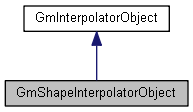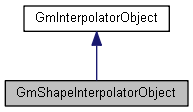 |
GemaCoreLib
The GeMA Core library
|
 |
GemaCoreLib
The GeMA Core library
|
Implements the Shape function and linear shape function interpolation methods. More...
#include <gmShapeInterpolatorObject.h>


Public Member Functions | |
| virtual GmInterpolatorType | type () const |
| Returns the interpolator object type. | |
| virtual bool | supportsInterpolatorKind (GmInterpolatorKind kind) const |
| Returns whether this interpolator object supports the given interpolator kind or not. | |
| virtual bool | requiresElement () const |
| Does this interpolator object requires that the coordinate set provided to interpolationWeights() contains points from a single element, whose identity can be queried by a call to GmCoordinateSet::cell()? Default = false. | |
| virtual bool | requiresNaturalCoordinates () const |
| Does this interpolator object requires that the coordinate passed as parameter to interpolationWeights() be expressed in natural coordinates? By default this is false and the provided coordinate should be cartesian coordinates. | |
| virtual bool | interpolationWeights (GmInterpolatorCoordinateSetBinding *pointSet, const GmVector &coord, const QVariant &typeParam, GmVector &weights) const |
| Implements the GmInterpolatorObject::interpolationWeights() virtual function to calculate interpolation weights by using the elements shape functions. More... | |
| virtual const GmMatrix & | gaussToNodesExtrapolationMatrix (GmInterpolatorGaussCoordinateSetBinding *pointSet, const QVariant &typeParam, GmMatrix &weights) const |
| Basic function for returning the extrapolation matrix used by the GM_GAUSS_TO_NODE_INTERPOLATOR interpolator kind. More... | |
 Public Member Functions inherited from GmInterpolatorObject Public Member Functions inherited from GmInterpolatorObject | |
| virtual bool | typeParamIsValid (const QVariant &v) const |
| Is the given interpolator type parameter valid? The default implementation accepts only empty variants. | |
| virtual QString | typeParamToStr (const QVariant &v) const |
| Converts an interpolator type parameter to a string. | |
| virtual bool | requiresMesh () const |
| Does this interpolator object requires that the coordinate set provided to interpolationWeights() contains information about the underlying mesh, whose identity can be queried by a call to GmCoordinateSet::mesh()? Default = false. | |
| virtual bool | distanceBasedWeights (GmInterpolatorCoordinateSetBinding *pointSet, const GmVector &coord, const GmVector &squaredDistances, const QVariant &typeParam, GmVector &weights) const |
| Worker function for the default implementation of interpolationWeights(). This is the function that needs to be reimplemented if the distance based approach used by interpolationWeights() is valid for this object. Otherwise, please reimplement interpolationWeights() itself. More... | |
Protected Member Functions | |
| GmShapeInterpolatorObject (bool linear) | |
| Constructor. | |
 Protected Member Functions inherited from GmInterpolatorObject Protected Member Functions inherited from GmInterpolatorObject | |
| GmInterpolatorObject () | |
| Protected default constructor to make sure that Interpolator objects are created only by the GmInterpolator friend class. | |
Protected Attributes | |
| const bool | _linear |
| Should we use a linear shape function instead of the original one? | |
Friends | |
| class | GmInterpolator |
Implements the Shape function and linear shape function interpolation methods.
IMPORTANT: When using this interpolator, the coordinate for the interpolation point must be given in the element's natural coordinate system.
|
virtual |
Basic function for returning the extrapolation matrix used by the GM_GAUSS_TO_NODE_INTERPOLATOR interpolator kind.
Given the set of coordinates for the known element points (usually integration points), this function should return an extrapolation weight matrix that, when multiplied by the point values, will return the interpolated values for the element nodes. If the point set has 'm' entries, the returned matrix will be an 'n x m' matrix where 'n' is the number of element nodes.
Depending on the interpolator type, the resulting matrix can be a constant matrix per integration rule/element type. In that case, the matrix does not need to be calculated and a reference to a fixed constant matrix can be returned. In those cases, instead of filling the given weight matrix with the values, the function can return a reference to that constant matrix and leave the provided matrix unchanged. On all other cases, the function should fill the weights parameter and return a reference to that parameter matrix.
Reimplemented from GmInterpolatorObject.
|
virtual |
Implements the GmInterpolatorObject::interpolationWeights() virtual function to calculate interpolation weights by using the elements shape functions.
The given pointSet is used only for recovering the supporting element. The coordinates in 'coord' should be natural coordinates. See the documentation for GmInterpolatorObject::interpolationWeights() for aditional information on the function parameters.
Reimplemented from GmInterpolatorObject.
 1.8.15
1.8.15